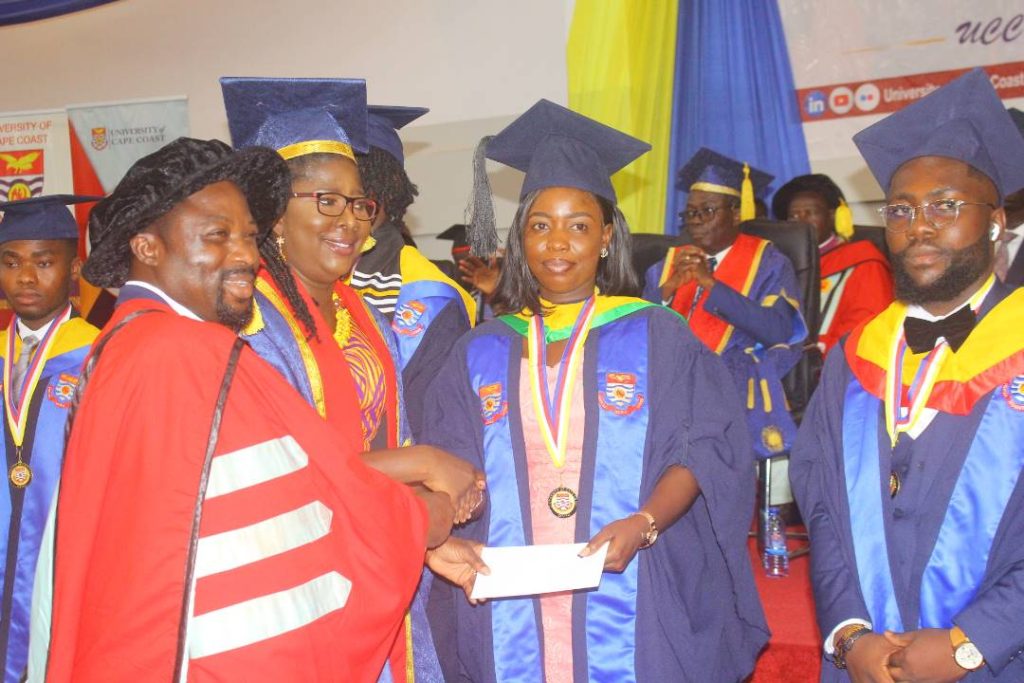By Prince Acquah
Cape Coast, March 31, GNA – The University of Cape Coast (UCC) has made an urgent appeal for private investments in student residential facilities on campus.
The school is grappling with a dire deficit in students’ accommodation, which had forced most students to rent private hostels and homes within the surrounding communities.
Consequently, it had recorded high incidence of theft, robbery and other vices on students which is undermining efforts by stakeholders at ensuring the safety of the students.
Prof Johnson Nyarko Boampong, the Vice Chancellor of UCC, speaking at the first and second sessions of the school’s 55th congregation on Thursday, noted that the authorities had signed a Memoranda of Understanding (MOU) with many companies to provide accommodation on campus, but none had materialised.
“We cannot sit aloof and allow the situation to continue. Therefore, the university will explore all avenues to ensure that we build befitting residential facilities for our cherished students,” he said.
The university graduated a total of 2,791 students, comprising 1,835 from the College of Humanities and Legal Studies (CHLS) and 956 from the College of Health and Allied Sciences (CoHAS) in the first and second sessions, respectively.

From CHLS, 170 students graduated with first class, 786 with second class upper, 551 with second class lower, 283 with third class and 45 had passes.
CoHAS, on the other hand, recorded 95 first class students, 550 in second class upper, 246 in second class lower, 59 in third class and six passes.
Mr Emmanuel Mawuli Atitso was adjudged the overall best graduating Business student from CHLS while Madam Emmanuella Obike graduated as the overall best student in CoHAS.
The overall best students and all other students who distinguished themselves in various programmes took home various prizes, including cash, laptops, books, and certificates.
Prof Boampong intimated that successive head of the school had undertaken many teaching and learning spaces, however, inadequate offices for lecturers and residential facilities for students remained a challenge.
In view of that he said the school had cut the sod for the construction of academic staff office complex for the faculties in the College of Humanities and Legal Studies and the College of Education Studies to enhance productivity.
Prof Obeng Mireku, Chairman of the schools’ Council, observed that the low level of rent paid by students, which did not provide realistic returns on investment, was a major disincentive for investors.
“It is my hope that university management, with support from government and the cooperation of student leadership, will settle on realistic rents that will attract the private sector to consider investing, especially in student accommodation on campus,” he said.
Beyond the infrastructural challenges, the Vice Chancellor noted that the scourge of encroachment on the school’s lands persisted, recounting that a recent attempt by the university to protect the remaining parcels of land was met with fierce resistance from some members of the surrounding communities.
“This notwithstanding, we are determined than ever to preserve the University, the only major institution that has brought unprecedented economic growth and honour to the Cape Metropolis and by extension, the Central Region of Ghana,” he noted.
In line with global trends, Prof Boampong said UCC was collaborating with several institutions across the world to support it goals of achieving greater visibility.
He said the school, during its recent visit to India, secured exchange programmes with some institutions of higher learning in that country to share experiences and resources.
In his advice to the graduates, he said the ceremony did not mark the end of their studies but the beginning.
He was confident that having gone through UCC, the students had been equipped with the requisite knowledge and skills to enable them to contribute their quota to national development.
“It is my prayer that, as you move into this unpredictable global arena, you remain resilient and put to use all the survival skills you have learnt within the University of Cape Coast here,” he said.
To the health students, he cautioned that the health care system had become technologically driven and further enhanced by artificial intelligence infrastructure.
“I, therefore, challenge you to explore and come out with more innovations on the already existing systems that may be more beneficial to our society.
“You are the hope of this nation. Do not allow circumstances to limit your potential. With determination, you can achieve more that you imagine,” he added.
GNA